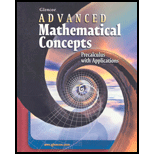
Concept explainers
a.
To solve:The equation
a.
Answer to Problem 37E
Explanation of Solution
Given:
Concept Used:
In mathematics, to solve an equation is to find its solutions, which are the values (numbers, functions, sets, etc.) that fulfill the condition stated by the equation.
Calculation:
For
Solution,
Here
Hence,
b.
To find: The solution of equationare whether complex conjugates.
b.
Answer to Problem 37E
The solution of equationare not complex conjugates.
Explanation of Solution
Given:
Concept Used:
In mathematics, the complex conjugate of a complex number is the number with an equal real part and an imaginary part equal in magnitude, but opposite in sign.
Calculation:
For quadratic equation
Solution,
This solution are two
(For conjugate numbers the form is
Hence,
The solution of equationare not complex conjugates.
c.
To find:Complex solution of the equation.
c.
Answer to Problem 37E
The solutions need not be complex conjugates (as we see the case here).
Explanation of Solution
Given:
Concept Used:
In mathematics, to solve an equation is to find its solutions, which are the values (numbers, functions, sets, etc.) that fulfill the condition stated by the equation.
Calculation:
For quadratic equation
Given equation
Solution,
What we know about a quadratic equation with real coefficient is that it will have either
- Two real solutions, or
- Same real solution, or
- Complex (conjugate) solutions.
Here equation does not have all real coefficient.
Hence,
The solutions need not be complex conjugates (as we see the case here).
d.
To check: The solution
d.
Answer to Problem 37E
The solution is correct.
Explanation of Solution
Given:
Concept Used:
In mathematics, to solve an equation is to find its solutions, which are the values (numbers, functions, sets, etc.) that fulfill the condition stated by the equation.
Calculation:
For quadratic equation
Given equation
Solution,
For
Same for
Hence,
The solution is correct.
Chapter 9 Solutions
Advanced Mathematical Concepts: Precalculus with Applications, Student Edition
Additional Math Textbook Solutions
Introductory Statistics
Pre-Algebra Student Edition
University Calculus: Early Transcendentals (4th Edition)
Calculus: Early Transcendentals (2nd Edition)
Using and Understanding Mathematics: A Quantitative Reasoning Approach (6th Edition)
Precalculus
- DO NOT GIVE THE WRONG ANSWER SHOW ME ALL THE NEEDED STEPS 11: A rectangle has a base that is growing at a rate of 3 inches per second and a height that is shrinking at a rate of one inch per second. When the base is 12 inches and the height is 5 inches, at what rate is the area of the rectangle changing?arrow_forwardplease answer by showing all the dfalowing necessary step DO NOT GIVE ME THE WRONG ANSWER The sides of a cube of ice are melting at a rate of 1 inch per hour. When its volume is 64 cubic inches, at what rate is its volume changing?arrow_forwardSox & Sin (px) dx 0arrow_forward
- 8 L 8 e ipx dxarrow_forwardFind the Taylor polynomial T³(×) for the function f centered at the number a. f(x) = xe-2x a = 0 T3(x) =arrow_forwardFor each graph in Figure 16, determine whether f (1) is larger or smaller than the slope of the secant line between x = 1 and x = 1 + h for h > 0. Explain your reasoningarrow_forward
- Points z1 and z2 are shown on the graph.z1 is at (4 real,6 imaginary), z2 is at (-5 real, 2 imaginary)Part A: Identify the points in standard form and find the distance between them.Part B: Give the complex conjugate of z2 and explain how to find it geometrically.Part C: Find z2 − z1 geometrically and explain your steps.arrow_forwardA polar curve is represented by the equation r1 = 7 + 4cos θ.Part A: What type of limaçon is this curve? Justify your answer using the constants in the equation.Part B: Is the curve symmetrical to the polar axis or the line θ = pi/2 Justify your answer algebraically.Part C: What are the two main differences between the graphs of r1 = 7 + 4cos θ and r2 = 4 + 4cos θ?arrow_forwardA curve, described by x2 + y2 + 8x = 0, has a point A at (−4, 4) on the curve.Part A: What are the polar coordinates of A? Give an exact answer.Part B: What is the polar form of the equation? What type of polar curve is this?Part C: What is the directed distance when Ø = 5pi/6 Give an exact answer.arrow_forward
- New folder 10. Find the area enclosed by the loop of the curve (1- t², t-t³)arrow_forward1. Graph and find the corresponding Cartesian equation for: t X== y = t +1 2 te(-∞, ∞) 42,369 I APR 27 F5 3 MacBook Air stv A Aa T 4 DIIarrow_forwardMiddle School GP... Echo home (1) Addition and su... Google Docs Netflix Netflix New folder 9. Find the area enclosed by x = sin²t, y = cost and the y-axis.arrow_forward
 Calculus: Early TranscendentalsCalculusISBN:9781285741550Author:James StewartPublisher:Cengage Learning
Calculus: Early TranscendentalsCalculusISBN:9781285741550Author:James StewartPublisher:Cengage Learning Thomas' Calculus (14th Edition)CalculusISBN:9780134438986Author:Joel R. Hass, Christopher E. Heil, Maurice D. WeirPublisher:PEARSON
Thomas' Calculus (14th Edition)CalculusISBN:9780134438986Author:Joel R. Hass, Christopher E. Heil, Maurice D. WeirPublisher:PEARSON Calculus: Early Transcendentals (3rd Edition)CalculusISBN:9780134763644Author:William L. Briggs, Lyle Cochran, Bernard Gillett, Eric SchulzPublisher:PEARSON
Calculus: Early Transcendentals (3rd Edition)CalculusISBN:9780134763644Author:William L. Briggs, Lyle Cochran, Bernard Gillett, Eric SchulzPublisher:PEARSON Calculus: Early TranscendentalsCalculusISBN:9781319050740Author:Jon Rogawski, Colin Adams, Robert FranzosaPublisher:W. H. Freeman
Calculus: Early TranscendentalsCalculusISBN:9781319050740Author:Jon Rogawski, Colin Adams, Robert FranzosaPublisher:W. H. Freeman
 Calculus: Early Transcendental FunctionsCalculusISBN:9781337552516Author:Ron Larson, Bruce H. EdwardsPublisher:Cengage Learning
Calculus: Early Transcendental FunctionsCalculusISBN:9781337552516Author:Ron Larson, Bruce H. EdwardsPublisher:Cengage Learning





